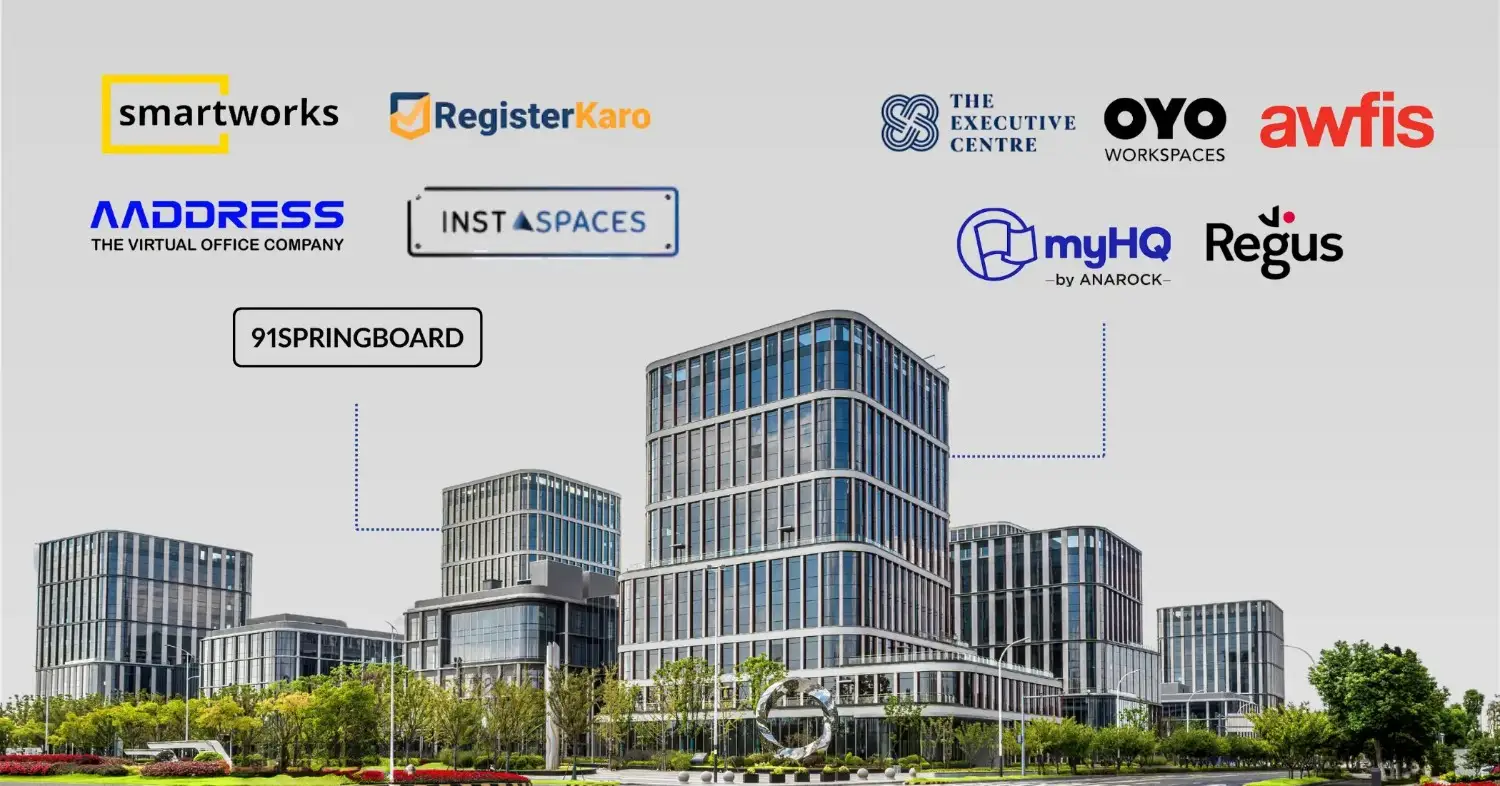
A virtual office is a professional business address without a physical office space. It provides services like mail handling, call answering, and sometimes meeting room access (varies for varying packages). Understanding virtual office advantages and disadvantages can help businesses decide if this flexible solution fits their operational needs.
After all, virtual office services are gaining popularity in India. Startups and small businesses use them to save on rent and overhead. Remote work and digital operations make them even more relevant. Companies can maintain a professional image without a full-time office. Many businesses even use virtual office addresses for GST registration, company incorporation, and business correspondence across major cities like Mumbai, Delhi, and Bangalore.
In this blog, we will explore the key benefits of a virtual office and cover the potential drawbacks. Finally, we will help you decide whether a virtual office is the right fit for your business.
What is a Virtual Office?
A virtual office gives you a professional business address and support services without a full-time physical office. You can work remotely and still maintain a credible business presence.
Typical services offered by virtual offices include:
- Mail handling and forwarding
- Phone answering in your company name
- Virtual receptionist or administrative support
- Access to meeting rooms or coworking spaces when needed
- Professional business address for cards, website, and registrations
In India, these addresses are also accepted by the Ministry of Corporate Affairs (MCA) and GST authorities for company and tax registration. However, proper documentation and agreements are in place.
Why Use a Virtual Office in India?
Virtual offices offer a unique balance between cost and professionalism. In comparison,
- A physical office gives you a dedicated space, but you pay for rent, utilities, furniture, and maintenance.
- A home office keeps expenses minimal, yet it does not provide a professional business address or proper meeting facilities.
A virtual office gives you a credible business presence, office services, and flexibility without requiring a full-time workspace.
Advantages of a Virtual Office Space
Some benefits of a virtual office space that make it an attractive choice for startups, SMEs, and remote teams are:
1. Cost Savings
Virtual offices reduce overhead costs significantly. Businesses save on rent, utilities, and office maintenance. They no longer pay for unused space or furniture. Employees can work remotely, which cuts commuting and travel expenses.
For example, a small startup in Mumbai can save up to 70% on monthly office costs by using a virtual office instead of leasing a physical space. Remote work also allows businesses to hire talent from anywhere without relocation costs. This makes virtual offices a highly cost-effective solution.
2. Professional Business Image
A virtual office gives your business a prestigious address. You can use it on business cards, websites, and official documents. This boosts credibility with clients, investors, and partners. Even without a physical office, your business appears professional and established. Clients are more likely to trust and engage with a company that has a prime business address.
3. Flexibility and Scalability
Virtual offices allow businesses to scale easily. You can add or remove services based on your needs without the hassle of long-term leases. Companies can hire remote teams globally and manage operations from anywhere. This flexibility helps startups test new markets and expand without heavy upfront costs.
4. Administrative Support
Virtual office packages often include mail handling, call answering, and often a virtual receptionist. These services improve efficiency and ensure professional communication with clients. Small businesses can operate smoothly without hiring additional staff. Administrative tasks are managed seamlessly, letting owners focus on core business activities.
5. Access to Meeting Spaces
Many virtual offices provide optional access to meeting rooms or coworking spaces. You can meet clients or hold team discussions whenever needed. This combines the convenience of a virtual office with the occasional need for physical presence.
In summary, a virtual office offers cost savings, credibility, flexibility, administrative support, and optional meeting spaces. Many providers like WeWork, Awfis, and Regus offer hybrid models where virtual office clients can book meeting rooms by the hour in business hubs across India.
While these benefits are appealing, it’s important to also consider the potential drawbacks of virtual offices.
Disadvantages of a Virtual Office Space
Virtual offices offer many advantages, but they also have limitations. It’s important to weigh these before choosing this setup.
1. Lack of Physical Presence
Virtual offices do not provide a permanent physical space for your business. This can make it harder to build client trust, especially for first-time customers. Some clients prefer face-to-face meetings or visiting a tangible office. Without a physical location, businesses may miss opportunities to strengthen personal connections and local visibility.
2. Limited Team Collaboration
Teams working remotely may struggle with communication. Collaboration and brainstorming can be less effective without in-person interaction. Company culture is harder to foster when employees rarely meet in person. Businesses must also invest in digital tools like Slack and Microsoft Teams and regular check-ins to keep the team connected and aligned. This can be a drawback because miscommunication, isolation, and slower decision-making may reduce productivity and weaken team cohesion over time.
3. Security and Privacy Concerns
Handling sensitive documents, client data, or business calls through virtual systems can create security risks. Businesses must adopt secure email, encrypted storage, and reliable IT systems. Failing to do so may lead to data breaches or privacy issues, which can harm the company’s reputation.
4. Dependence on Technology
A virtual office relies heavily on digital tools and internet connectivity. Poor network connections, software issues, or IT failures can disrupt operations. Businesses must ensure they have reliable technology, backup systems, and technical support to maintain smooth operations.
Virtual offices save costs and offer flexibility, but they may limit physical presence, team collaboration, and client perception. Security and technological reliability also require attention. Businesses should weigh these challenges against the benefits before choosing a virtual office.
Is a Virtual Office Right for Your Business?
A virtual office works best for businesses that want flexibility, cost savings, and a professional presence without a full-time physical space. To decide if it suits your business, ask yourself these questions:
- Do you need a fixed physical workspace, or can your team work remotely?
- How often do you meet clients or partners in person?
- Do you have a remote or distributed team across cities or countries?
- What is your budget, and how sensitive are you to overhead costs like rent and utilities?
- How important is brand image and a prestigious business address for your market or clients?
- Are you comfortable managing a team remotely, with employees working independently?
If a fully virtual setup seems challenging, many companies adopt a hybrid approach. They use a virtual office for registration, branding, and administrative tasks while accessing coworking spaces or meeting rooms when needed. This way, businesses enjoy the convenience and cost benefits of a virtual office, while still having physical space available for client meetings, workshops, or team collaboration.
By assessing these factors, you can determine whether a virtual office or a hybrid solution best fits your business.
How to Use a Virtual Office in India?
Setting up a virtual office is easy if you follow practical steps. Here’s how businesses in India can make the most of it:
- Choose the right provider carefully: Compare services, pricing, and locations. Ensure they offer mail handling, call answering, and optional meeting room access.
- Pick a prestigious business address: Locations in cities like Mumbai, Delhi, or Bangalore add credibility. This helps with client trust and registrations.
- Use the address for official registrations: You can register for GST and other licenses using the virtual office address.
- Set up communication tools: Use VoIP, business phone lines, and email systems. Cloud storage and collaboration tools keep your team connected.
- Organize mail and call handling: Decide who manages incoming mail and client calls. Track and respond promptly to maintain professionalism.
- Schedule occasional in-person meetings: Book coworking spaces or meeting rooms when you need to meet clients or conduct workshops.
- Maintain a professional brand presence: Use your virtual office address on websites, invoices, business cards, and marketing materials.
- Review services regularly: Evaluate if the current plan meets your business needs. Upgrade or scale services as your team grows.
- Train your team: Ensure employees know how to use virtual systems, handle client communications, and maintain professionalism remotely.
These steps help Indian businesses reduce costs, maintain a professional image, and operate efficiently with a virtual office.
Conclusion
A virtual office gives Indian businesses flexibility, cost savings, and a professional presence without a full-time office. Understanding the virtual office pros and cons helps businesses plan effectively. With occasional in-person meetings and proper systems, most challenges can be managed. It is a practical solution for startups, freelancers, and SMEs aiming to grow efficiently and maintain credibility.
Frequently Asked Questions
Yes, a virtual office address can be used for company registration in India. It is valid for GST, MCA registration, and other official documents. Using a professional address helps maintain credibility and allows businesses to operate legally without a physical office. Ensure the provider allows official correspondence and documentation handling.




